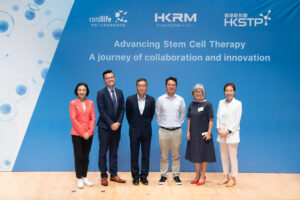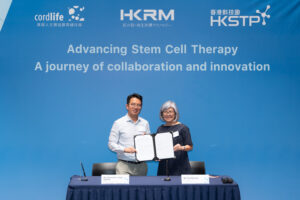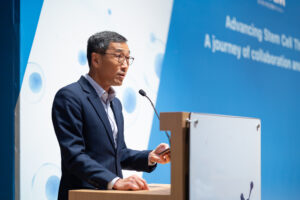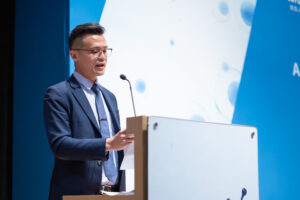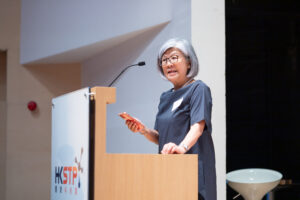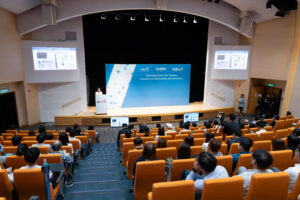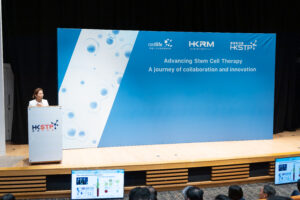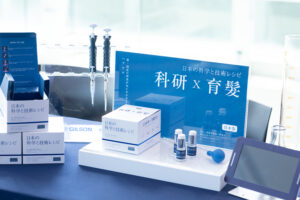Press
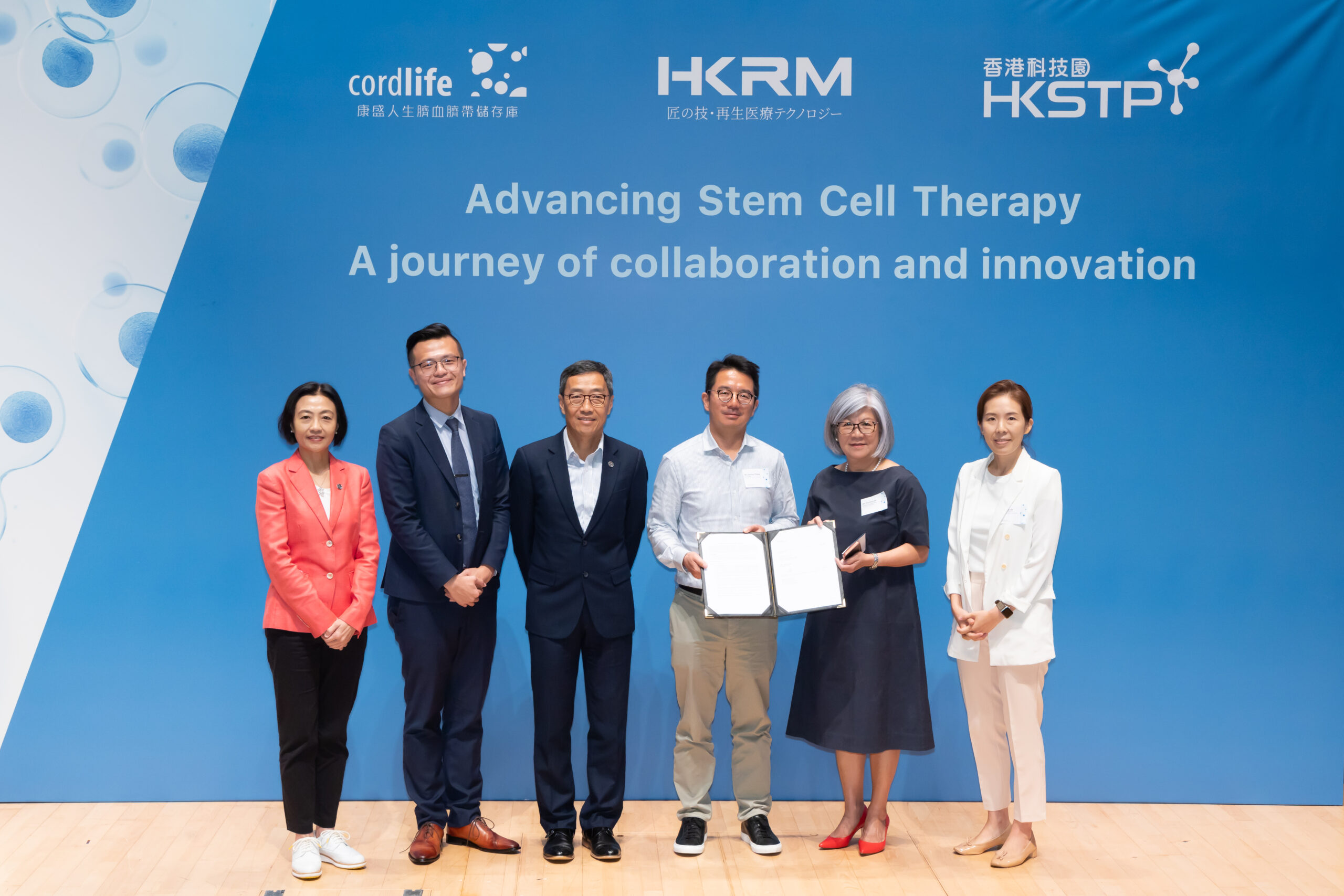
HKSTP Partner Companies HKRM and Cordlife Sign Collaboration Agreement
To Advance Stem Cell Therapy and Improve Awareness of Regenerative Medicine
A new breakthrough in stem cell-derived treatments provide osteoarthritis patients with a safe, effective, and minimally invasive option
(Hong Kong, 21 July 2023) – Hong Kong Science and Technology Parks Corporation (HKSTP) partner companies Hong Kong Regen MedTech Limited (HKRM) and Cordlife Hong Kong Limited (Cordlife) announced their partnership to co-launch a regenerative medical project focused on Mesenchymal Stem Cells (MSCs) biology.
With Hong Kong’s ageing population, demand for osteoarthritis treatments is on the rise. Patients typically experience joint pain, swelling, and “cracking” sounds in their bones, with simple tasks like climbing stairs becoming unbearable. Current research highlights the challenges of arthritis patients in Hong Kong:
- Nearly 17% of men and nearly 24% of women aged 50 or above suffer from joint pain issues.
- With degenerative arthritis, current non-surgical management typically involves using hyaluronic acid or corticosteroid injections which may not be suitable for all patients.
- Surgical treatment primarily involves artificial joint replacement. According to the Hospital Authority, there are currently almost 35,000 cases on the waiting list for full joint replacement surgeries in Hong Kong.
The rapid development of regenerative medicine holds promising prospects for patients with degenerative arthritis.
Using umbilical cord-derived MSCs to provide hope for treating osteoarthritis
In treating osteoarthritis, the current non-surgical management typically involves using hyaluronic acid or corticosteroid injections. However, these therapies may not be suitable for all patients, and there are concerns about the potential side effects of corticosteroids, including an increased risk of cataracts, glaucoma, hypertension, diabetes, and osteoporosis. Surgical treatment primarily involves an artificial joint replacement. With nearly 35,000 cases on the waiting list for full joint replacement surgeries in Hong Kong, patients are subjected to suffering in the meantime. Artificial joints also have a limited “lifespan” of approximately 20 years, and whether such treatment is suitable for the patient should be assessed by the doctor. With the advancement in regenerative medical technology, studies have found that MSCs can repair degenerated joints, bringing hope for patients in the treatment of osteoarthritis.
The rapid development of regenerative medicine holds promising prospects for patients with osteoarthritis. Dr. Kirsty Lee, Chief Medical Officer of HKRM, explained: “Through MSCs, degenerated joints undergo tissue repair, offering a glimmer of hope for the treatment of osteoarthritis. Clinically used MSCs at the moment can be obtained from different tissues such as bone marrow, the umbilical cord, and adipose tissue, MSCs possess not only the functions of differentiation and proliferation but also tissue repair, marking a great potential in the field of cellular therapy.”
Currently, two types of stem cells can be used: the first is a patient’s own stem cells obtained through surgery from adipose tissue, also known as fat. These cells are then cultured outside the body for three to four weeks, or until a sufficient number is obtained. These cells are then reintroduced to the affected area to facilitate tissue repair. However, the cost of this treatment makes it unavailable to some patients.
The second, more promising method involves the extraction of MSCs from the umbilical cord, which are then subjected to cell culture and stringent quality testing in Japan before being reintroduced to the affected areas for tissue repair.
Stem cells are present in various parts of the human body. When tissues undergo injury, ageing, or disease, the stem cell population within the tissue proliferates, differentiates, and generates new tissue to replace the damaged one. Scientists have discovered during the cultivation process stem cells would continually release secretome and extracellular vesicles that can interact with surrounding cell factors. Effects include accelerating proliferation, modulation of immune and inflammation response, and enhancing tissue repair and regeneration.
Promoting regenerative medicine: Nurturing the seeds of stem cell therapy
Under the “Medtech Co-Create” programme of HKSTP, partner companies HKRM and Cordlife hosted a press conference titled “Advancing Stem Cell Therapy: A Journey of Collaboration and Innovation” at Hong Kong Science Park. With the support of HKSTP, HKRM and Cordlife announced collaborative projects involving regenerative medicine. The collaboration aims to increase public awareness of regenerative medicine, as well as promoting the development of regenerative medicine in Hong Kong. The ultimate goal is to provide patients with a safe, effective, and minimally invasive treatment option.
Mr Stanley Sy, Founder and CEO of HKRM, said: “We have always supported the regenerative medical industry and the development of multiple biotech companies. We firmly believe that this field will become a major trend in the future of the biotech industry. This captures Hong Kong’s focus on and support for the development of regenerative medicine.”
Ms Tan Poh Lan, Group CEO and Executive Director of Cordlife Group Limited, mentioned: “We are honoured to collaborate with HKRM to improve patient conditions through regenerative medicine. Cordlife has always been committed to developing innovative solutions and striving to help people live healthier lives. This partnership with HKRM embodies and extends our mission.”
Mr Albert Wong, CEO of HKSTP, said: “HKSTP is committed to building a thriving world-class biomedical technology ecosystem in Hong Kong. This is an exciting partnership between two park companies, HKRM and Cordlife, as they jointly develop progressive treatments in regenerative medicine technology to benefit patients and promote adoption of ground-breaking innovation in the biomedical industry. HKSTP is currently home to over 200 biotech companies, and through our MTCC Programme, we hope to foster collaboration between park companies and our network of corporate partners to grow and elevate Hong Kong’s status as a leading global innovation hub.”
Dr Grace Lau, Head of Institute for Translational Research of HKSTP, said: “The HKSTP MedTech Co-Create platform includes more than 200 partner companies and incubatees, with over 1,200 researchers from 12 countries, covering fields such as Food Tech, Nutraceutics, Cosmetics, Traditional Chinese Medicine, Medical Devices, Stem Cell & Regenerative Medicine and Therapeutics. This platform aims to jointly build a comprehensive healthcare system that provides one-stop applications for prevention, diagnosis, treatment, monitoring and rehabilitation, cultivating a patient-centric culture while providing solutions. The collaboration between HKRM and Cordlife reflects how the MTCC platform accelerates the development and commercialisation of innovative Advanced Therapy Products.”
Dr Kirsty Lee, Chief Medical Officer of HKRM, explains: “One out of every five people over the age of 40 in Hong Kong suffers from joint degeneration, which not only causes pain but also leads to inconveniences in daily life. Improper treatment may also generate other health problems in cardiology or nephrology. Currently, joint replacement is an effective method to alleviate pain and improve mobility, but the waiting time for surgery in Hong Kong could be as long as three to nine years, which means an indefinite and lengthy wait for patients.”

